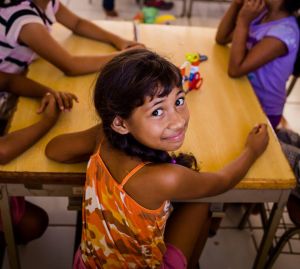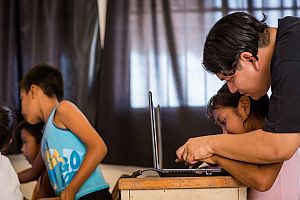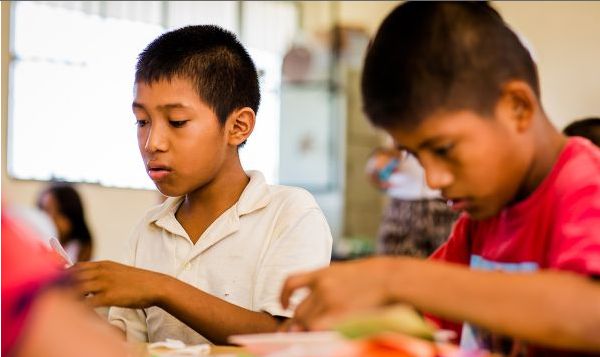Hays, Kansas - Up against the mountains on the eastern edge of the Pacific coast resort city of Puerto Vallarta, Mexico, lies the impoverished suburb Colonia Volcanes. One of Megan Shelton's two teaching jobs is there.
The other one is in a Puerto Vallarta private school, where she teaches seventh- and eighth-grade English language arts. "And I much prefer the attitudes of the kids at Volcanes," she said. "It's a day and night difference."
 |
For VCEP, she teaches English for fifth- and sixth-grade students and also teaches English for "secondary" students, which, in Mexico, is after sixth grade.
Shelton was speaking in an interview while in Hays in November to help promote the project through presentations to various groups and coordinate with two Fort Hays State University classes that are collaborating on a crowdfunding campaign for the Envision Volcanes project in Mexico.
The campaign was created by a Writing for Public Relations class taught by Dr. Hsin-Yen Yang (pronounced sheen-yen-yahng), assistant professor of communication studies at FHSU. They were supported by a Diverse Learners class taught by Dr. Lorie Cook-Benjamin, assistant professor of teacher education. Her class researched the information used for the crowdfunding campaign, which officially kicked off on Nov. 24. The goal is to raise $15,000 by spring.
VCEP, said Shelton, is an entirely volunteer-funded project.
 |
The feeding program for the Volcanes school began in 2007. By 2011, a new public school building had been built next to the old four-room building, which was abandoned. That was the year that FHSU's involvement began, through Dr. Ron Fahey, then chair of the Department of Advanced Education Programs. Cook-Benjamin was also one of that first group.
"Lorie has been one of the biggest and most consistent supporters of the program," said Shelton, adding, "and she served as a mentor for me when I was an adjunct professor."
That first year, faculty members from FHSU, with local parents and the colonia council, cleaned and painted the old building, installed electricity and lighting, and the after-school program began. The university's contingent of volunteers also brought in flat-screen TVs for two classrooms, which now have Internet access and the students can play online games in English, all to supplement the English course work, said Shelton.
 |
Shelton also began teaching there in the fall of 2011, the first full year of the after-school program, teaching English to third- and fourth-graders. She is a native of Austin, Texas, earning a Bachelor of Science in communication with a minor in Spanish from Texas A&M University in 2007. This year, she received a Master of Science in Education with an emphasis in English for speakers of other languages from FHSU.
VCEP also provides teachers, so that students can receive three hours of English instruction each week, and one hour of computer class. Shelton said that $600 a month gets one teacher for the school.
"I stole one of the teachers from the private school where I teach," said Shelton. That teacher, Claudia Iniguez, is in her first year at Volcanes.
"She now teaches the adult class, the morning junior high class and reading intervention for first- and second-graders who are not yet reading in Spanish," said Shelton.
 |
VCEP serves several purposes. First and foremost, it is an endeavor in "growing minds, changing lives," as the tag line for Envision Volcanes puts it, to lift people out of poverty through education.
It is also an opportunity for students at FHSU to give service and gain experience and understanding in their professions. In this fall's project, it involves a communication studies class and an elementary education class.
Listening to Shelton, it is clear that for her it is also a labor of love, and her days involve a lot of teaching. She teaches at the private school from 7:15 to 9:20 a.m. Then she drives out to Volcanes, stopping to pick up Iniguez. In Volcanes, Shelton teaches a fifth-grade class from 10 to 11 and a sixth-grade class from 11 to 12.
Lunch is available in a kitchen built by a Canadian Scouts group. "One of the mothers, Doña Irma, cooks," she said. "It's all-you-can-eat tortillas for 25 pesos, which is about $2."
From 1 to 2, she teaches another fifth-grade class. In Mexico's public schools, students are divided into shifts to avoid overcrowding. The morning shift in the regular classes get their English and computer instruction in the afternoons. Shelton's afternoon sixth-grade students are from 2 to 3 pm.
Then she teaches an extra hour from 3 to 4 for a junior high class, meaning post-sixth grade, "because so many kids from last year wanted to continue their education."
"And they're my favorite," she said, "because they are junior high kids, and they should hate school and have terrible attitudes, but they don't. They're the best kids I've ever had the opportunity to work with."
Envision Volcanes, Mexico, the crowdfunding site, is at gofundme.com/envisionvolcanes. The campaign email is envisionvolcanes(at)gmail.com. Envision Volcanes is also on Facebook and on Twitter, @VolcanesProject.
Original article


